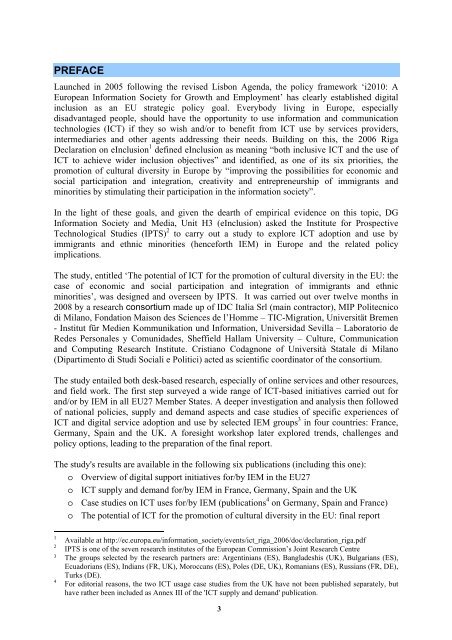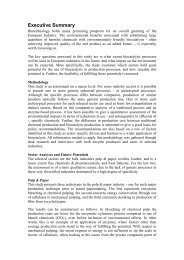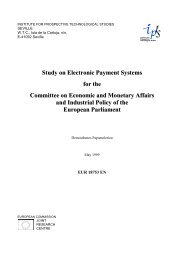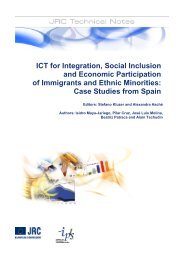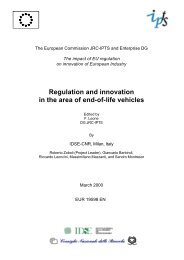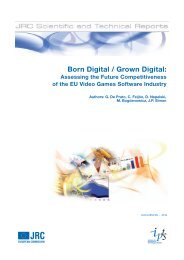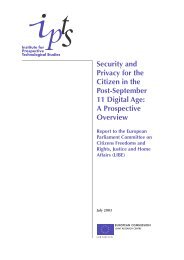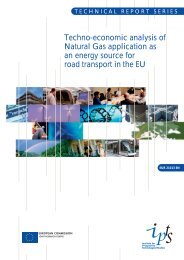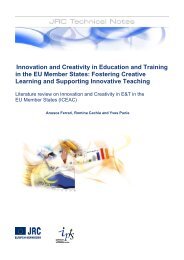ICT for Integration, Social Inclusion and Economic Participation of ...
ICT for Integration, Social Inclusion and Economic Participation of ...
ICT for Integration, Social Inclusion and Economic Participation of ...
You also want an ePaper? Increase the reach of your titles
YUMPU automatically turns print PDFs into web optimized ePapers that Google loves.
PREFACE<br />
Launched in 2005 following the revised Lisbon Agenda, the policy framework ‘i2010: A<br />
European In<strong>for</strong>mation Society <strong>for</strong> Growth <strong>and</strong> Employment’ has clearly established digital<br />
inclusion as an EU strategic policy goal. Everybody living in Europe, especially<br />
disadvantaged people, should have the opportunity to use in<strong>for</strong>mation <strong>and</strong> communication<br />
technologies (<strong>ICT</strong>) if they so wish <strong>and</strong>/or to benefit from <strong>ICT</strong> use by services providers,<br />
intermediaries <strong>and</strong> other agents addressing their needs. Building on this, the 2006 Riga<br />
Declaration on e<strong>Inclusion</strong> 1 defined e<strong>Inclusion</strong> as meaning “both inclusive <strong>ICT</strong> <strong>and</strong> the use <strong>of</strong><br />
<strong>ICT</strong> to achieve wider inclusion objectives” <strong>and</strong> identified, as one <strong>of</strong> its six priorities, the<br />
promotion <strong>of</strong> cultural diversity in Europe by “improving the possibilities <strong>for</strong> economic <strong>and</strong><br />
social participation <strong>and</strong> integration, creativity <strong>and</strong> entrepreneurship <strong>of</strong> immigrants <strong>and</strong><br />
minorities by stimulating their participation in the in<strong>for</strong>mation society”.<br />
In the light <strong>of</strong> these goals, <strong>and</strong> given the dearth <strong>of</strong> empirical evidence on this topic, DG<br />
In<strong>for</strong>mation Society <strong>and</strong> Media, Unit H3 (e<strong>Inclusion</strong>) asked the Institute <strong>for</strong> Prospective<br />
Technological Studies (IPTS) 2 to carry out a study to explore <strong>ICT</strong> adoption <strong>and</strong> use by<br />
immigrants <strong>and</strong> ethnic minorities (hence<strong>for</strong>th IEM) in Europe <strong>and</strong> the related policy<br />
implications.<br />
The study, entitled ‘The potential <strong>of</strong> <strong>ICT</strong> <strong>for</strong> the promotion <strong>of</strong> cultural diversity in the EU: the<br />
case <strong>of</strong> economic <strong>and</strong> social participation <strong>and</strong> integration <strong>of</strong> immigrants <strong>and</strong> ethnic<br />
minorities’, was designed <strong>and</strong> overseen by IPTS. It was carried out over twelve months in<br />
2008 by a research consortium made up <strong>of</strong> IDC Italia Srl (main contractor), MIP Politecnico<br />
di Milano, Fondation Maison des Sciences de l’Homme – TIC-Migration, Universität Bremen<br />
- Institut für Medien Kommunikation und In<strong>for</strong>mation, Universidad Sevilla – Laboratorio de<br />
Redes Personales y Comunidades, Sheffield Hallam University – Culture, Communication<br />
<strong>and</strong> Computing Research Institute. Cristiano Codagnone <strong>of</strong> Università Statale di Milano<br />
(Dipartimento di Studi <strong>Social</strong>i e Politici) acted as scientific coordinator <strong>of</strong> the consortium.<br />
The study entailed both desk-based research, especially <strong>of</strong> online services <strong>and</strong> other resources,<br />
<strong>and</strong> field work. The first step surveyed a wide range <strong>of</strong> <strong>ICT</strong>-based initiatives carried out <strong>for</strong><br />
<strong>and</strong>/or by IEM in all EU27 Member States. A deeper investigation <strong>and</strong> analysis then followed<br />
<strong>of</strong> national policies, supply <strong>and</strong> dem<strong>and</strong> aspects <strong>and</strong> case studies <strong>of</strong> specific experiences <strong>of</strong><br />
<strong>ICT</strong> <strong>and</strong> digital service adoption <strong>and</strong> use by selected IEM groups 3 in four countries: France,<br />
Germany, Spain <strong>and</strong> the UK. A <strong>for</strong>esight workshop later explored trends, challenges <strong>and</strong><br />
policy options, leading to the preparation <strong>of</strong> the final report.<br />
The study's results are available in the following six publications (including this one):<br />
o Overview <strong>of</strong> digital support initiatives <strong>for</strong>/by IEM in the EU27<br />
o <strong>ICT</strong> supply <strong>and</strong> dem<strong>and</strong> <strong>for</strong>/by IEM in France, Germany, Spain <strong>and</strong> the UK<br />
o Case studies on <strong>ICT</strong> uses <strong>for</strong>/by IEM (publications 4 on Germany, Spain <strong>and</strong> France)<br />
o The potential <strong>of</strong> <strong>ICT</strong> <strong>for</strong> the promotion <strong>of</strong> cultural diversity in the EU: final report<br />
1 Available at http://ec.europa.eu/in<strong>for</strong>mation_society/events/ict_riga_2006/doc/declaration_riga.pdf<br />
2 IPTS is one <strong>of</strong> the seven research institutes <strong>of</strong> the European Commission’s Joint Research Centre<br />
3 The groups selected by the research partners are: Argentinians (ES), Bangladeshis (UK), Bulgarians (ES),<br />
Ecuadorians (ES), Indians (FR, UK), Moroccans (ES), Poles (DE, UK), Romanians (ES), Russians (FR, DE),<br />
Turks (DE).<br />
4 For editorial reasons, the two <strong>ICT</strong> usage case studies from the UK have not been published separately, but<br />
have rather been included as Annex III <strong>of</strong> the '<strong>ICT</strong> supply <strong>and</strong> dem<strong>and</strong>' publication.<br />
3


